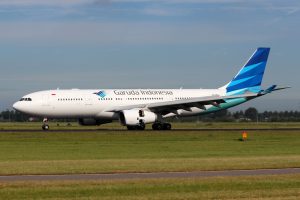In the past, whenever I flew from Jakarta to Tokyo for Asian Development Bank Institute events, the ADBI would always book me on Garuda, Indonesia’s national flag carrier. The flights have never been more than half-full, so I don’t know if that particular route is lucrative or not, but in general Garuda’s high-volume domestic routes are more profitable. Why then does Garuda continue to operate these long-haul routes between Jakarta and various international cities if they are not big cash cows, or even if they lose money? If Garuda wants to maximize profits, why doesn’t it drop unprofitable routes and focus on more efficient ones with bigger margins?
This question comes up a lot in discussions of state capitalism, and I think it has to do with a kind of ingrained bias many people have in the way they think about capitalism and business. The typical argument is that national airlines like Garuda, which is 60 percent owned by the government of Indonesia, are inefficient because they are badly run. And they are badly run because they are government-run. They take on too much debt, they let their costs get out of control, they are overly diversified, they don’t focus on more profitable routes. The argument usually goes that if Garuda were privatized, competitive market pressure would force it to operate more efficiently and thus more profitably.
Garuda’s financial woes, including a recent default on a $500 million sukuk bond, would seem to support this notion. But leaving aside for the moment that we are in the middle of a global pandemic that has made air travel nearly impossible, I would argue that the real purpose that Garuda serves in the political economy of Indonesia is not in fact to be profitable. Its real purpose is not to return value to its shareholders and pay a cash dividend to the Indonesian state. Garuda’s primary function is to ensure that given a limited ability to regulate the airline industry, the state is able to exercise some degree of control over the sector through other means.
The market cannot always be relied on to deliver results that are aligned with the economic or strategic interests of a sovereign state. If a state has competent regulatory oversight and sound legal or institutional architecture, these can sometimes mitigate against such misaligned incentives. But in a country like Indonesia, with an unreliable legal and regulatory environment, if left to its own devices the market often fails. And a sector like the airline industry, which serves numerous critical economic and geopolitical functions, cannot be thrown open to the whims of the free market. So, instead of using regulatory fixes, the state has simply inserted itself into the market through its ownership of Garuda.
This serves two functions. One, it allows the state to operate geopolitically important routes that may not make sense from a purely financial perspective. Lion Air, Indonesia’s other major domestic airline which maximizes profit to a fault, does not operate a Jakarta to Tokyo route, probably because the margins aren’t there. But Garuda does, because Japan and Indonesia have important business ties, and so maintaining connections with places like the ADBI has value for the Indonesian state beyond just the revenue it generates for the airline. It’s part of a bigger network of international relations and economic ties that are more about geopolitics then they are about bottom lines.
Second, it gives the state some leverage in trying to control domestic prices. An important government priority is that domestic air travel be affordable: cheap tickets grease the wheels of the economy because they mean more flights, more tourism, more business deals, more conferences. If prices cannot be controlled due to weak regulatory oversight, it can at least be attempted through other means. In 2019, air travel dropped in Indonesia. This means Garuda’s operating expenses were lower, but it didn’t show up in cheaper tickets. Ticket prices actually increased. Essentially Garuda acted like a profit-maximizing company in 2019, and made a tidy return.
But I’m not sure that is what its majority shareholder, the government of Indonesia, wanted. This is purely conjecture on my part, but it does seem a little coincidental that in 2019, while Garuda was booking big profits and ignoring government orders to lower prices, the airline was forced to re-state its 2018 earnings. It had to do with the way future revenue from a contract was booked on the income statement. In other words, it’s the kind of accounting thing that if the Board of Commissioners and financial regulators wanted to, they maybe could have let slide but they didn’t. And after that, airfares did start to come down a bit.
Garuda is often caught in this kind of identity crisis, where it’s meant to be both a viable profit-seeking business while also serving important strategic functions for the economy and the state. And these mandates can be at odds with one another, as in the case of higher ticket prices. Ultimately, it is difficult for the government to actually set prices. But when the government is also the majority shareholder, it creates less pressure for Garuda to be super profitable. This goes against a lot of our basic instincts about businesses and how they should behave but I think it’s important, especially now as Garuda struggles financially, to widen our understanding of state-owned companies and the role they play in mixed state capitalist economies like Indonesia’s.
































